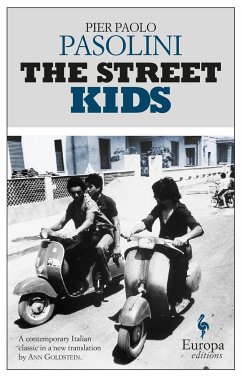The "provocative" novel about hard-living teenagers in poverty-stricken postwar Rome, by the renowned Italian filmmaker (The New York Times).
Set during the post-World War II years in the Rome of the borgate-outlying neighborhoods beset by poverty and deprivation-The Street Kids tells the story of a group of adolescents belonging to the urban underclass. Living hand-to-mouth, Riccetto and his friends eke out an existence doing odd jobs, committing petty crimes, and prostituting themselves. Rooted in the neorealist movement of the 1950s, The Street Kids is a tender, heart-rending tribute to an entire social class in danger of being forgotten.
Heavily censored and criticized, lambasted by much of the general public upon its publication, The Street Kids nevertheless had a force and vitality that eventually led to its being considered a masterpiece. This new translation comes from Ann Goldstein, the acclaimed translator of Elena Ferrante's Neapolitan novels.
Hinweis: Dieser Artikel kann nur an eine deutsche Lieferadresse ausgeliefert werden.
Set during the post-World War II years in the Rome of the borgate-outlying neighborhoods beset by poverty and deprivation-The Street Kids tells the story of a group of adolescents belonging to the urban underclass. Living hand-to-mouth, Riccetto and his friends eke out an existence doing odd jobs, committing petty crimes, and prostituting themselves. Rooted in the neorealist movement of the 1950s, The Street Kids is a tender, heart-rending tribute to an entire social class in danger of being forgotten.
Heavily censored and criticized, lambasted by much of the general public upon its publication, The Street Kids nevertheless had a force and vitality that eventually led to its being considered a masterpiece. This new translation comes from Ann Goldstein, the acclaimed translator of Elena Ferrante's Neapolitan novels.
Hinweis: Dieser Artikel kann nur an eine deutsche Lieferadresse ausgeliefert werden.
Praise for Pier Paolo Pasolini
"[Pasolini was a] brilliant intellectual, a director, and a homosexual, whose political vision-based on a singular entwinement of Eros, Catholocism, and Marxism-foresaw Italian history after his death, and the burgeoning of global consumerism."
-Ed Vulliamy, The Guardian
"Pasolini is Italy's most important twentieth century poet."
-Alberto Moravia, author of The Conformist and Roman Tales
"Pasolini was an artist and thinker who tried not to resolve his contradictions but rather to fully embody them."
-Dennis Lim, The New York Times
"Pasolini does in prose what Giuseppe Gioachino Belli had done in poetry a century before, namely voice society's dregs in their own distinctive idiom."
-TLS
"Pasolini was always searching, completely open to different ways of looking at things."
-Jytte Jensen, curator of the Pasolini retrospective at the Museum of Modern Art, New York
"[Pasolini was a] brilliant intellectual, a director, and a homosexual, whose political vision-based on a singular entwinement of Eros, Catholocism, and Marxism-foresaw Italian history after his death, and the burgeoning of global consumerism."
-Ed Vulliamy, The Guardian
"Pasolini is Italy's most important twentieth century poet."
-Alberto Moravia, author of The Conformist and Roman Tales
"Pasolini was an artist and thinker who tried not to resolve his contradictions but rather to fully embody them."
-Dennis Lim, The New York Times
"Pasolini does in prose what Giuseppe Gioachino Belli had done in poetry a century before, namely voice society's dregs in their own distinctive idiom."
-TLS
"Pasolini was always searching, completely open to different ways of looking at things."
-Jytte Jensen, curator of the Pasolini retrospective at the Museum of Modern Art, New York








